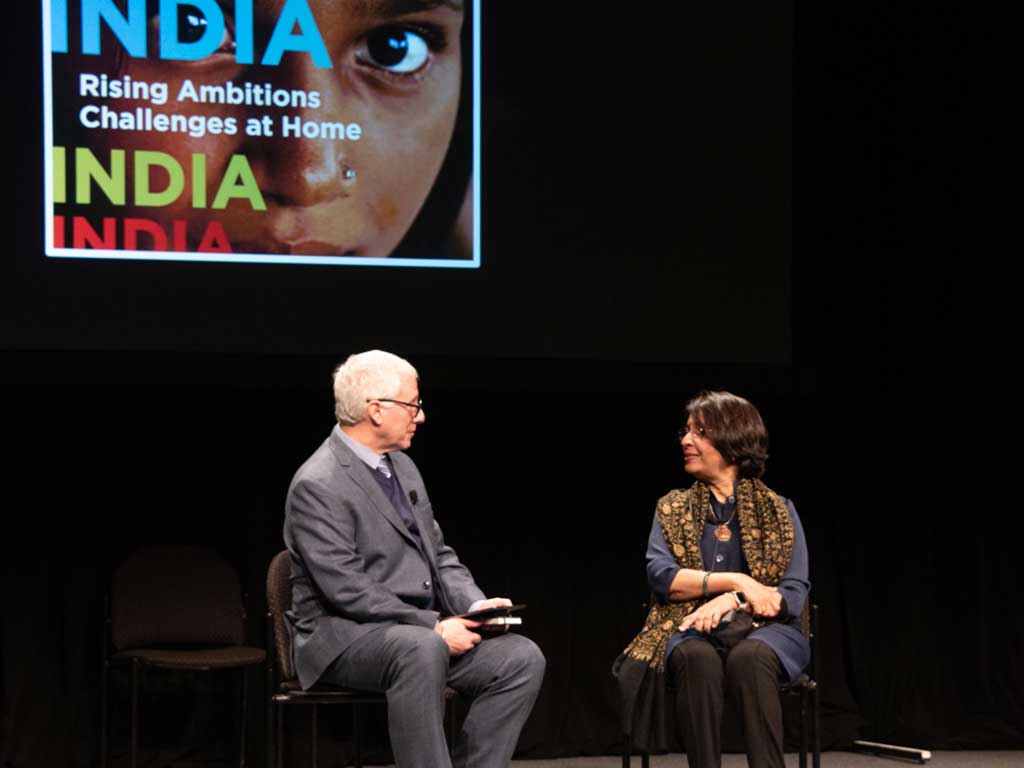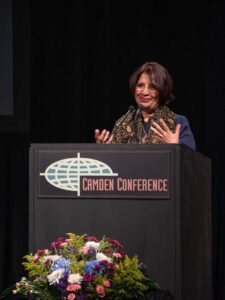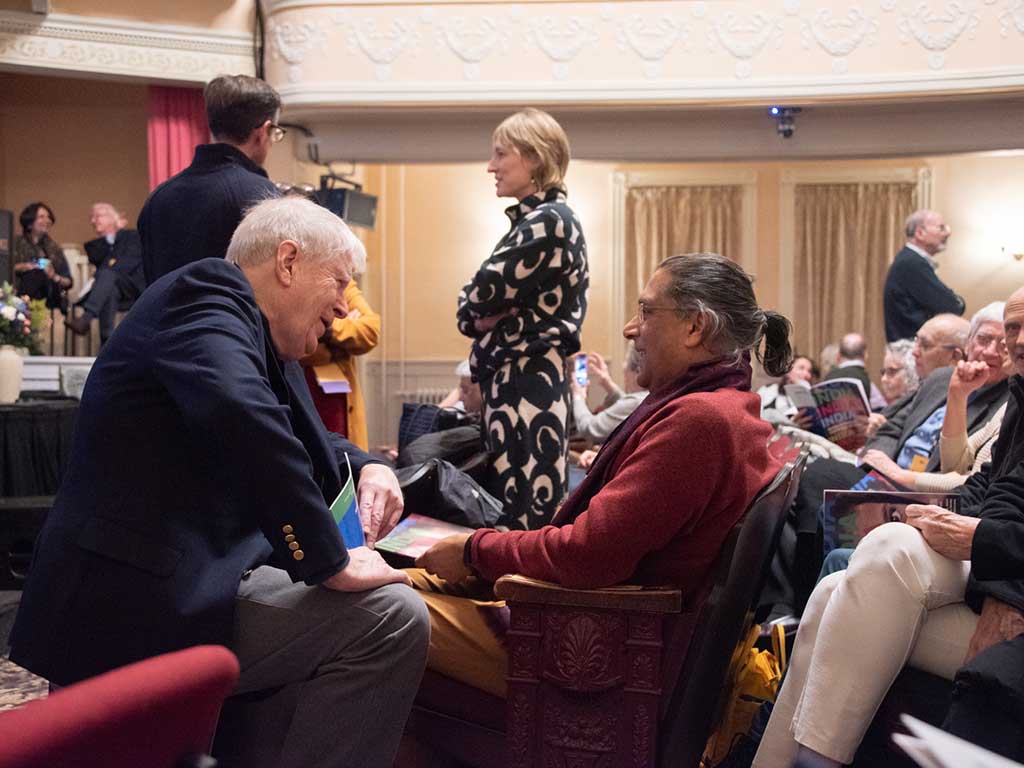
By Eva McVicar
In its 37th year, the Camden Conference once again turned the town of Camden into a hub of international dialogue. This year’s topic: India: Rising Ambitions, Challenges at Home. The weekend-long Conference, centered in the historic Camden Opera House and live-streamed to satellite locations, including Portland, featured top minds from foreign policy, academia, and journalism.
All sessions were skillfully moderated by David Brancaccio, host of public radio’s “Marketplace Morning Report. Brancaccio’s quick-witted and insightful approach elevated the event. Brimming with lively discussions, meaningful connections, and eye-opening discoveries, participants could experience an intellectual journey unlike any other in Maine.
Live-stream to USM

A group of Camden Conference attendees and USM students gathered at Luther Bonney Hall at USM for Friday evening, all day Saturday, and Sunday morning to watch the weekend’s fast-paced talks and lively Q&A. For many intellectually curious locals who are interested in exchanging ideas with internationally minded neighbors and friends, attending the live stream of the Camden Conference at USM has become a tradition. Several breaks, notably for Saturday lunch, allowed for congenial discussions.
This year’s Camden Conference theme reflected India’s growing global significance.
India is the world’s largest democracy with the world’s largest population. With a rapidly advancing economy, India maintains its democratic status. However, India grapples with persistent challenges, entangled with legacies of colonialism and the caste system. Princeton history professor Pratap Mehta and Brown political science professor Ashutoff Varshney provided a captivating overview of post-colonial history of nation building. They shed light on the story of Indian exceptionalism, the Indian concept of a universalist dimension to humanity, and the danger of decline of secular pluralism as anchored in the Indian constitution.
New York Times correspondent Emily Schmall, who reported from India for four years, shared her firsthand experiences. Journalists face threats and harrassment for dissenting views and critical reporting. Despite India’s vibrant newspaper culture, with a massive circulation of 225 million daily newspapers in multiple languages, smaller papers are increasingly being targeted and shut down.
“India is reimagining itself…”

Keynote speaker Nirupama Rao was India’s Foreign Secretary and first woman ambassador to the United States, China, and Sri Lanka. Amplified by the elephant in the room—Prime Minister Narendra Modi and his government’s push for Hindu nationalist policies and country identity —Rao downplayed the concerns of fellow Indian speakers. She used poetic imagery of India to showcase a harmonic mosaic of diverse people and religions. “There is an electricity about the place. India is reimaging itself and this is a moment of pride, a redefinition of most of the people,” said the ambassador.
Despite concerns about the decline of liberal democracy and the rise of Hindu nationalism in shaping a national identity, coupled with challenges such as restricted opportunities for women and the frequent targeting of religious minorities, speakers underscored that Prime Minister Modi continues to enjoy widespread popularity. He draws support across diverse ethnic and religious identities. Also, many perceive Modi as a competent national leader who is elevating India’s status as a rising global power.
Democracy doesn’t run on autopilot.
Panel discussions were a highlight of the conference. The extraordinary group of speakers brought different perspectives and backgrounds to the stage. When Professor Pratap Mehta questioned Daniel Markey, senior advisor on South Asia at the United States Institute of Peace about U.S. foreign policy hypocrisy in the past 30 years, Markey admitted that the U.S. falls short of its ideals. He acknowledged inconsistency in upholding values within the liberal international order. The challenge lies in maintaining trust among countries sharing the same values, despite perceived American hypocrisy. “While we Americans still get upset being accused of hypocrisy, not living up to our own ambitions is good.” Markey added, “It’s when we don’t get upset, we are in trouble.”
For democracy to flourish and live up to its promises, citizens must engage actively and feel empowered. The fate of democracy in India, as well as in the US, rests in the hands of its citizens. Echoing the sentiments of Alexis de Tocqueville, a figure frequently cited by the speakers, democracy doesn’t run on autopilot. It demands generational upkeep. That’s why we hope you will join us for the 38th Camden Conference, Democracy under Threat: A Global Perspective.

About the Camden Conference
The Camden Conference is a 98% all-volunteer organization. In a rapidly changing world, the organization focuses on cultivating civic engagement, global understanding, and empowering Maine’s citizens and future leaders to navigate today’s interconnected world. The Camden Conferece reserves 20% of total live attendance for high school and college/university students at reduced fees.
About the Author
Eva McVicar is the Development & Communications Coordinator at Camden Conference. Eva first heard about the Conference while attending one of the organization’s community events at Portland Public Library with her son. Captivated by the unique nature of this citizen’s forum for discussing global issues, Eva started volunteering before eventually taking on her current role. Originally from the former Czechoslovakia (now Czech Republic), Eva worked in international education and journalism before. She is a seasoned resident of Portland. Eva appreciates the city’s diverse cultural fabric and the experience of living near the ocean, a departure from her landlocked homeland.



